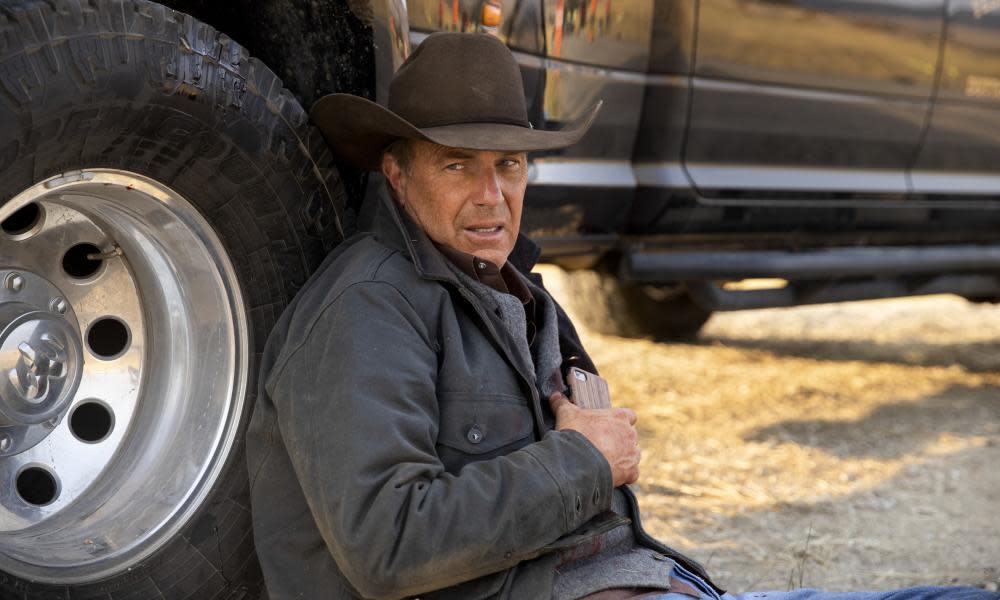‘Game of Thrones set on a ranch’: the wild popularity of Kevin Costner’s violent, rubbish TV show

The most visually extraordinary, morally ambivalent, gratuitously violent, sexually confused show on TV isn’t one you hear spoken about a lot, in the UK at least. Perhaps that’s because, despite being one of the most remarkable TV programmes of recent years, Yellowstone isn’t actually very good.
Its huge success in the US has led, after a rash of terrible reviews on its launch in 2018 (“A soapy mess,” according to this paper), to it being reconsidered in the light of viewing figures that were outstripping everything else on cable. The season four finale earlier this year was the most-watched show on cable since The Walking Dead’s season eight opener five years ago. If one compares its viewing figures with Succession, there’s no contest: Yellowstone has 12 times the viewers.
That contrast is instructive, because it is to Succession that Yellowstone has become a point of critical comparison. Both are about patriarchs ruthlessly protecting their empires (in Yellowstone, it is Kevin Costner, as John Dutton, owner of the largest ranch in the US), while their adult children revel in mutual hatred. Both have a shockingly ruthless redheaded daughter among their offspring. Both have a hapless sidekick from outside the central family. Both posit their familial unit as the notional heroes of the show, if only by making the opponents of their empire just as revolting.
But Yellowstone is seen, somehow, as the idiot child next to Succession, perhaps because its characters are not media elites who drive commentary on culture. And also because of the suspicion that it is at heart a rightwing show (it’s a common notion that it is Succession for Trump voters). But as the former Reagan and Bush Sr speechwriter John Podhoretz wrote in the New York Post: “While the stakes in Succession are the kind nobody outside the media could ever really care about – is there any reason to care which of the rotten people we watch will get to run the Roy empire? – the central conflict in Yellowstone is nothing less than who owns America.”
I suspect Costner’s presence is the reason for the moral ambiguity of Yellowstone. Whereas Brian Cox, Succession’s patriarch, has always been an actor, Costner has long been a leading man. And leading men are heroes, even when their characters are painted in shades of grey. There are notable contrasts between Costner’s most recent movie lead, in Let Him Go, and Yellowstone. Both are neo-westerns, albeit Let Him Go was set 60 years ago. In both, Costner is a man who is stepping away from his life’s work, and in both he is unafraid of violence in support of his beliefs. But in Let Him Go – rescuing his grandson from psychopaths – he is unequivocally good. Whereas in Yellowstone, it is only the fact that John Dutton is played by Costner that leads us to any assumption of goodness, for Dutton himself is psychopathic, no matter how undemonstrative he is (cowboys on the ranch are branded with hot irons, to show that they are owned).
If Yellowstone is holding a mirror up to red-state America, then red-state America must be spectacularly deluded. For Yellowstone goes far beyond libertarian ideals; if anything, it shows the chaos when institutions are subverted to individual needs (no branch of Montana’s state government is above corruption) and the consequences for all lives – the family’s included – when violence in defence of property becomes the norm. The entire Dutton family lives in perpetual fear. They are not happy in their empire, ever, because terror begets more terror.
So violent is Yellowstone, in fact, that rather than this being Succession set on a ranch, a more apt comparison may be that it is Game of Thrones set on a ranch. As with Game of Thrones, land and its conquest is the overriding theme, and as with Game of Thrones, life is expendable and law matters less than might. Justice in Yellowstone is a medieval concept, meted out on the hoof (often literally, from horseback) without recourse to lawbooks. Miscreants are hanged summarily, and the Duttons dish out punishment as they see fit, sorting out any difficulties with the legal authorities later: it’s a rite of passage for new ranch-hands to kill for the Duttons. And troubling sexuality is present in the relationship between John Dutton and his daughter, Beth (Kelly Reilly), in which the electra complex burns strong (not least because it is family lore that Beth was responsible for her own mother’s death).
And still, for all its moral complexity and its visual beauty (and the best credits and opening theme on TV), Yellowstone is not good TV. Its showrunner, Taylor Sheridan, wrote the excellent border narcos movie Sicario, yet Yellowstone is filled with the kind of clunky writing you would recognise from the big 80s US soaps. Plenty of characters exist only as ciphers. Some of its complexity is unintentional, caused by its failure to develop themes it starts opening, only to leave them unexplored and unresolved.
Yellowstone is big and flawed and beautiful. It is silly and meretricious and stunning. It’s not so-bad-it’s-good, because it’s not as bad as that. It’s the only thing on TV that manages to be amazing and startling without actually being good. Watch it.
Season four of Yellowstone is streaming on Paramount+ in the UK and Stan in Australia, with new episodes on Wednesdays.

 Yahoo News
Yahoo News 
